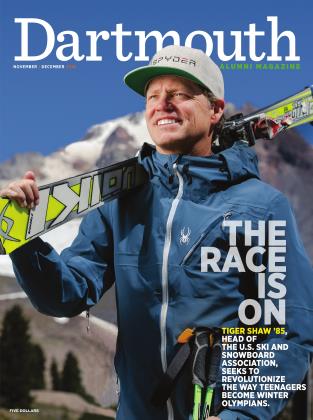Emotional Explorers
Hank Rogerson ’89 and Jilann Spitzmiller ’89
NOVEMBER | DECEMBER 2016 Abigail Drachman-Jones ’03Hank Rogerson ’89 and Jilann Spitzmiller ’89
NOVEMBER | DECEMBER 2016 Abigail Drachman-Jones ’03Husband-and-wife filmmakers Hank Rogerson ’89 and Jilann Spitzmiller ’89 are known for taking viewers inside worlds they’d probably rather ignore: a nursing home, a medium-security prison, an Indian reservation. “In these places people are segregated, roped off, and we don’t want to look at what’s going on in there,” says Spitzmiller. “Our work is about looking in places that have some darkness on the outside, but finding what’s good and true and light inside.”
Before they started winning film awards, Rogerson and Spitzmiller were seniors at Dartmouth running around campus with a VHS camera to create a video yearbook. “My favorite sequence was when Hank spent a whole day at career advisory services during the winter, when everyone was starting to interview with companies that came to campus. They all have their suits on and they’re completely uncomfortable,” Spitzmiller says. “There I was just shoving my camera into people’s faces as they were trying to get ready to interview with Leo Burnett!” Rogerson says. The film was shown at their 25th reunion.
Next year the couple’s latest documentary, Still Dreaming, airs on PBS. It’s atender, often hilarious story about elderly, longretired Broadway actors, musicians and dancers putting on A Midsummer Night’s Dream as they battle Alzheimer’s, hearing loss and the emotional ravages of age, all in an effort to do what they love: perform.
The Santa Fe, New Mexico-based couple seems to run toward crisis and redemption. Shakespeare Behind Bars (2005) is about a prison theater troupe seeking atonement from heinous crimes. Homeland (2000) follows four Latoka Indian families struggling with poverty and poor health on an Indian reservation. “We are emotional explorers,” says Spitzmiller. “We have to be brave to go into aplace a lot of people don’t want to go. It’s about deepening the idea about what we feel, see, hear and know from others around us.”
“We make a bridge for people to these worlds that are ‘other,’ ” Rogerson says. “We show up as a witness.”
Abigail Drachman-Jones ’03
 View Full Issue
View Full Issue
More From This Issue
-
 FEATURE
FEATUREIn a League of His Own
November | December 2016 By TY BURR ’80 -
 COVER STORY
COVER STORYKing of the Hill
November | December 2016 By JAMES ZUG ’91 -
 FEATURE
FEATUREDramatically Different
November | December 2016 By HEATHER SALERNO -
 THE DAM INTERVIEW
THE DAM INTERVIEWPhil Hanlon ’77
November | December 2016 By C.J. Hughes ’92 -
 RETROSPECTIVE
RETROSPECTIVETales of the Nugget
November | December 2016 By JESSICA FEDIN ’17 -
 MEDICINE
MEDICINEA Zika Response
November | December 2016 By KAITLIN BELL BARNETT ’05
Abigail Drachman-Jones ’03
-
 Article
ArticleLiterary Hijinks
NovembeR | decembeR By Abigail Drachman-Jones ’03 -
 Article
ArticleA Fantasy Life
JAnuAry | FebruAry By Abigail Drachman-Jones ’03 -
 VOICES IN THE WILDERNESS
VOICES IN THE WILDERNESSBravissimo!
MARCH | APRIL By Abigail Drachman-Jones ’03 -
 pursuits
pursuits"A Scary Moment”
JULY | AUGUST 2017 By Abigail Drachman-Jones ’03 -

Keeper of the History of Life
JANUARY | FEBRUARY 2018 By Abigail Drachman-Jones ’03 -
 pursuits
pursuitsIncredible Journeys
MAY | JUNE 2018 By Abigail Drachman-Jones ’03
Voices in the Wilderness
-
 VOICES IN THE WILDERNESS
VOICES IN THE WILDERNESSBravissimo!
MARCH | APRIL By Abigail Drachman-Jones ’03 -
 Voices in the Wilderness
Voices in the WildernessBright Idea
SEPTEMBER | OCTOBER 2015 By ABIGAIL JONES ’03 -
 Voices in the Wilderness
Voices in the WildernessLexi Krupp '15
NOVEMBER | DECEMBER 2021 By C.J. Hughes ’92 -
 Voices in the Wilderness
Voices in the WildernessOn a Roll
SEPTEMBER | OCTOBER 2020 By Christopher Cartwright ’21 -
 Voices in the Wilderness
Voices in the WildernessGlobal Perspective
JULY | AUGUST 2021 By Elizabeth Janowski ’21 -
 Voices in the Wilderness
Voices in the WildernessEducation for All
NOVEMBER | DECEMBER 2017 By HEATHER SALERNO

